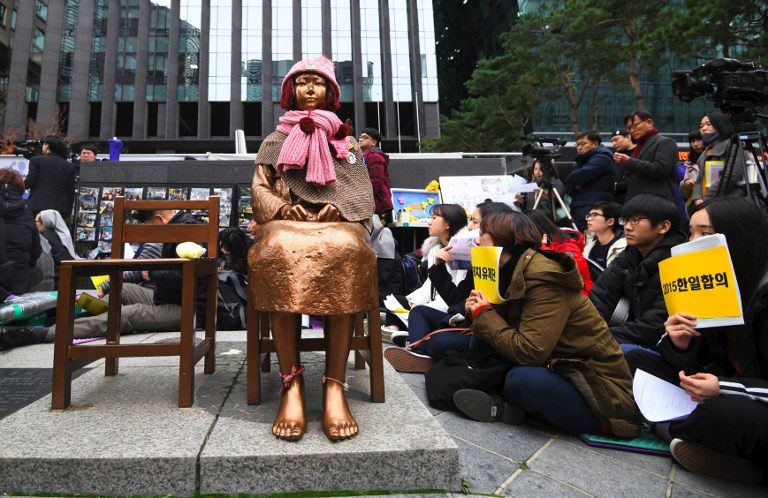SUMMARY
This is AI generated summarization, which may have errors. For context, always refer to the full article.

SEOUL, South Korea – South Korea on Wednesday, November 21, announced the formal shutdown of a controversial Japanese-funded foundation created to help former wartime sex slaves – a move that will further sour ties between the neighbors.
It sparked a sharp reaction from Tokyo, which summoned the South Korean ambassador and urged Seoul to respect its “international promise”.
The issue of the women forced into sexual slavery for Japanese troops during the Second World War – so-called “comfort women” – is a highly emotional one that has marred the relationship between South Korea and its former colonial ruler Japan for decades.
Despite both being democracies, market economies and US allies which have to contend with the twin threats of an overbearing China and nuclear-armed North Korea, ties between Seoul and Tokyo are heavily colored by disputes over history and territory.
The foundation was created as a result of a controversial 2015 bilateral deal, in which Tokyo transferred 1 billion yen ($8.8 million at current exchange rates) as compensation for the victims and Seoul agreed not to raise the issue again.
But the agreement – finalized by former South Korean President Park Geun-hye as the US sought to repair its key Asian allies’ relationship – angered some victims who described it as falling short of holding Japan responsible for wartime abuses.
Park’s successor and current president Moon Jae-in condemned the deal and his administration earlier this year vowed to return the money to Japan, while falling short of repudiating the pact.
“We… will take legal steps to formally dissolve the Reconciliation and Healing Foundation,” said Seoul’s gender equality ministry, which oversees the body.
“We have… decided to end the project based on the result of our reviews and current circumstances around the foundation,” it said in a statement, adding it would seek to find a “reasonable way to handle” the remaining money sent by Japan.
Tokyo reacted strongly, demanding South Korea honor the pact or risk tarnishing its reputation.
“The Japan-South Korea agreement of 3 years ago was the final and irreversible resolution,” Prime Minister Shinzo Abe told reporters in Tokyo.
“If an international promise is broken, it becomes impossible to keep ties between one country and another. I hope that South Korea, as a member of the international community, will take a responsible action,” Abe said.
The foreign ministry in Tokyo summoned the South Korean ambassador to explain the move.
Dozens of victims or their families have claimed 4.4 billion won ($3.9 million) from the foundation since its inception in 2016. The South’s government has since covered the expense with its own funding.
Mainstream historians say up to 200,000 women, mostly from Korea but also from other parts of Asia including China, were forced into sexual slavery for Japanese soldiers.
Many South Koreans harbor resentment over Tokyo’s brutal 1910-45 occupation of the peninsula, and the two nations are embroiled in a territorial row as well over Seoul-controlled islets also claimed by Japan. – Rappler.com
Add a comment
How does this make you feel?
There are no comments yet. Add your comment to start the conversation.